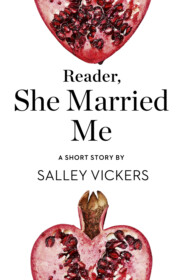По всем вопросам обращайтесь на: info@litportal.ru
(©) 2003-2024.
✖
The Other Side of You
Настройки чтения
Размер шрифта
Высота строк
Поля
‘You could make jelly with those,’ Elizabeth Cruikshank suggested, looking away from me to the garden. ‘It makes good jelly, quince.’
I dropped by Cath Maguire’s office later on my way home.
Maguire was a lesbian but not the sort that doesn’t get on with men. I had occasionally speculated what had made Maguire prefer her own sex. She was an attractive, sparky woman and while not my type exactly certainly could have been many men’s. But when I once tentatively started on this line, she shut me up by saying, ‘You’re not suggesting that women are second best or anything, are you, Dr McBride?’
But one lucky consequence of Maguire’s preference was that we had the kind of good-natured intimacy which is only possible between a man and a woman where sex will never be a factor. And I’d long given over questioning the whys and wherefores of Maguire’s sexuality. What mattered to me was that I trusted her instincts and depended on them to fill out my own.
‘How’re you getting on with Mrs Cruikshank?’ I asked.
‘Elizabeth? I like her. Quiet, like I said. Doesn’t make demands. Probably doesn’t make enough. Always very polite.’
‘Any visitors?’
‘None I’ve seen, anyway. A couple of phone enquiries from her children but so far as I know they haven’t visited.’
So she had children. I wouldn’t have guessed this and there was no mention of them on her record. She looked almost too girlish to have given birth. ‘How many?’
‘Two, I gather. A boy and a girl. The girl was a bit, you know, stand-offish but the boy sounded nice.’
By the phone in her room was a book squashed face down. Maguire read two or three books a week.
‘Does she read?’
‘She’s got a couple of books out of the library, but now you come to mention it, I’ve not seen her read them, unless she keeps them for nights.’
‘What are they? Did you see?’
Maguire screwed up her face as she did when trying to concentrate. It gave her a look of a small girl which always made me feel warm towards her.
‘Not fiction anyway.’
Maguire devoured fiction. Her favourite author was Ruth Rendell but I’d noticed some surprising ones too. For a time she seemed to be reading her way through Proust.
‘She used to be a librarian.’
‘Really? I wouldn’t mind that job myself.’
‘Too late,’ I said. ‘I need your help here.’
‘You know, I don’t know if in the long run a really great story isn’t more help.’
7 (#ulink_6bcd7ce4-497f-5e59-9424-e31eab73777c)
THAT AUTUMN, OLIVIA HAD DECIDED TO ENROL IN SOME evening classes and she was out at one of them when I got home. She had a tendency to these sudden enthusiasms. They rarely lasted, and I therefore hadn’t bothered to ask much about this latest. I was never quite abreast of which class was when, partly because I was glad to have an hour or two to myself. Olivia never forbade me anything openly but it’s not so agreeable to listen to Schubert, or Bach, when the person with you would rather hear The Archers. Not that I’ve anything against The Archers—it was more that Olivia had something against Schubert: she assumed respect for my tastes but somehow it had the discouraging effect of dislike.
I had a deadline for a paper I was reviewing for a clinical journal, which was an added reason for preferring my own thoughts. So when the phone rang and interrupted them I was put out till I heard Gus Galen’s voice.
‘Can you beat it?’ Gus was one of those people who never announce themselves, as if one spent one’s time simply waiting to hear from them alone. ‘They’ve got that baboon Jeffries giving the keynote address. What the hell is a “keynote” anyway, when it’s at home?’
‘I don’t know,’ I said. ‘A musical metaphor maybe?’
Gus was referring to the international conference on anxiety and depression which was to take place the following year.
‘Nothing melodious about Jeffries’ approach. It wasn’t so long ago he was advocating bloody lobotomies.’
Lobotomy, or leucotomy, the surgical severance of the frontal lobe of the brain from the subcortical area, became fashionable as a remedy for intractable depression in the late thirties and during the forties and fifties something like 80,000 such surgical operations were performed before it dropped out of style again. But since 1970 there had been a revival of interest in the procedure.
Gus was one of the first modern neurological experts to query the wisdom of this, which, as with everything else, he did vociferously.
‘They claim it worked on monkeys but I wonder what the poor beasts would say about it if they could speak,’ he said, not long after our first encounter. ‘Those baboons haven’t a bloody clue how it works on humans, if it works at all, which I doubt. Monkeying about with the brain like that as if they were God All Bloody Mighty, though God would have more sense than to be so interfering.’ As with many of his other associations, Gus appeared to have some informal access to the mind of God.
There was, and still is, a political division in our profession between an interventionist approach, which roughly speaking means drugs and ECT, and the so-called ‘talking cure’. Most psychiatrists practised a largely unconsidered mixture of the two, but Gus was passionately against the hard-line attitude and his training in neurology combined with his forceful personality gave him clout.
There’s a place for drugs, and with schizophrenia or bipolar states only a fool or a miracle worker would attempt to manage without them. But, by and large, I was of Gus’s mind. In fact—and of course he knew this—it was as a result of seeing the consequences of a lobotomy that I began my analytic training.
Mr Beet was a retired bank manager, a man with a large florid face gone blurred around the edges. He was neat as a guardsman, always in a pressed shirt and jacket and tie, but in the way that a small child is turned out, when the impression matters more to the dresser than the dressed. It was his wife who kept him trim. Her hobby was making padded coat hangers, a distraction, I surmised, from the sight of her husband’s motionless misery. He had been an active man once, she told me with remembered pride, though overactive when the anxiety dominated. By the time it was my job to monitor her husband he sat with his mouth never properly closed. You couldn’t say he stared out of the window—his eyes were too horribly devoid of any directed interest.
Mrs Beet had soft English skin and fine hair and delft-blue eyes and seemed always to be holding on to some part of her husband, his hand, his elbow, his knee, patting it to remind him—or perhaps herself—that she was there. Despair, and loyalty, had taught her to make the hangers, when she came with him to the hospital for his occupational therapy. I imagine he simply sat there and she, like a mother with an awkward child, covered the hangers for him. One Christmas, she gave me three as a present. ‘I don’t suppose you’ll have any use for them, Dr McBride, but maybe your wife would like them, that is if…’ I reassured her that I had a wife. She was a sensitive woman and would have hated to make a mistake about my marital status, or my sexuality. Olivia, unusually, welcomed the gift: the padded contours, it turned out, were useful for her evening clothes.
I speculated sometimes about Mrs Beet and where she had ended up. It was unlikely that her husband lived long in that condition. ‘He was depressed before, yes, Doctor,’ she told me in her deferential yet subtly assertive tone, ‘and anxious. But anxiety and depression aren’t the worst things. They never told us how it would be afterwards. Nothing’s as bad as seeing him like this with all the light, and with all the sorrow too, gone from his eyes.’
‘I agreed to do the response,’ Gus said, ‘but I’ve got this prostate problem hanging over me and there seems to be a feeling I shouldn’t push my luck for the next month or two afterwards. All right if I get you to take my place?’
Mrs Beet appeared unassuming but she had a certain tenacious force which had a way of ensuring that the apparition of her mutilated husband stayed somewhere in the back rooms of my mind. It made one of its haunting reappearances now.
‘Oh, God, Gus,’ I pleaded, trying to dodge the reproachful recollection, ‘I’d much rather not.’
This was a major colloquium and I was reluctant to take on Jeffries, who regarded intellectual opposition as tantamount to declaration of war. He could block the career of those who were hostile to his views and although I wasn’t ambitious I was cautious. As I say, I liked a quiet life.
‘Why not?’ I was aware the tone was being made deliberately peevish. Gus had a whim of iron and didn’t scruple to bend you to it. ‘Time someone other than me made a noise.’
‘I haven’t your enthusiasm for mud-stirring, Gus.’
‘Don’t need to say anything startling. Just say how you might treat a serious-seeming case without zapping their brain cells to smithereens with drugs we don’t understand or bloody electrical impulses ditto. You must have someone you’re seeing who fills the bill.’
When I next saw Elizabeth Cruikshank the year had crossed the shadow line when the clocks change and the late-afternoon light, an hour further from the sun, had begun to fail.
‘Spring forward, fall back’ was how my mother taught us to remember which way the clocks moved at the spring and autumnal equinoxes and, as with many of her proverbial sayings, the words stayed in my mind. They stayed my mind, too, those familiar phrases, providing some kind of outposts of reassurance. Perhaps it was her way of mothering me, or perhaps—more fairly—it was an element of her mothering I was able to accept.
Poor Mother. I rejected her as much as she rejected me—and for the same reason. Neither of us could bear the other with Jonny gone—or, rather, neither of us could bear that he had gone and we were, each of us, the reminder that he had. It was years before it occurred to me that my mother believed I blamed her for Jonny’s death every bit as much as I believed she blamed me. After all, it was she who had been uncharacteristically ill that fatal morning and allowed her two small sons to go off unsupervised.
Maybe I did blame her? I can’t be sure. There’s so little I am sure of now, but I was surer in the St Christopher days. I was sure, for example, that the business of Elizabeth Cruikshank’s marriage was unimportant. It wasn’t, I would have bet my pension on it, the relationship with Neil which had left her knocking at death’s door.
As we spoke, that afternoon, I was aware that I had come to associate his name with the onset of lethargy. Drowsiness stole through me, and I began to feel impatience over the man whose impression remained too nebulous to be the centre of the mystery which had brought his wife to me. As we sat with the room darkening round us, I had an acute sense of her feeding me titbits of trivia.
‘We lived in Hampstead at first. But we moved to be near Neil’s parents.’
‘Did you miss Hampstead?’











